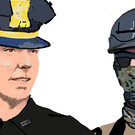Join our Cancer Conversations, help and be helped by your neighbors
Every day, most of us read or see or hear of news from around the world that is distressing — from the war in Syria to the earthquake in Turkey. We feel powerless to do anything about it. Although the pictures we see and the voices we hear come right into our living rooms and work spaces they are, in reality, hundreds or thousands of miles away.
With local news, though, we can make a difference. Last week, we posted online the day it happened the story of a fire on Armstrong Circle in Guilderland. One of the neighbors of the family who had been forced from their home called us a few days later.
“This made me realize I don’t know all my neighbors,” said Eileen Borden who has lived in the development with two dozen houses since 1994.
That is true of many of us. “We get so caught up in our own busy-ness,” said Borden.
She decided to do something about it, and went door to door in her neighborhood to see who wanted to help. She also wrote a letter to us, which we published last week.
Many of us connect electronically — through texts or emails or social media — with the people we know, some of them in far-flung places. But that sometimes comes at the expense of knowing the people right in our midst.
We are reminded of a passage from one of our favorite books, Harper Lee’s “To Kill a Mockingbird.” Lee wrote the book in the 1950s; it was set in a southern town in the 1930s during the Great Depression.
The novel’s narrator, 6-year-old Scout Finch, says, “Neighbors bring food with death and flowers with sickness and little things in between. Boo was our neighbor. He gave us two soap dolls, a broken watch and chain, a pair of good-luck pennies, and our lives. But neighbors give in return. We never put back into the tree what we took out of it: we had given him nothing, and it made me sad.”
That notion of neighborliness and its requirements has largely disappeared. Few people would do what Scout’s father did, following the directive of the world’s most prevalent religions: Love thy neighbor as thyself. Atticus Finch, a white lawyer in a small Southern town, risked his livelihood and even his life to defend a wrongly accused black man.
But many people, probably most, used to observe the everyday niceties of being neighbors — “the little things in between.” It makes us as sad as Scout that neighborly give and take has become rare. We don’t believe that people are less caring than in earlier generations. It’s simply that the sense of place that once grounded that caring has often disintegrated.
We’ve written over the years, for instance, about the volunteer ambulance crews largely being replaced by paid professionals. Many fraternal organizations, too, have gone by the wayside.
Our newspaper, though, for well over a century has served as a way for people in our area to connect with one another. We often, for example, write stories that lead to fundraisers for people struck by disaster — with fire or flooding or illness. We run columns from the Community Caregivers, a not-for-profit group that harnesses the energy and expertise of volunteers to help the elderly and ailing stay in their homes. The group uses the slogan “Neighbors helping neighbors.”
In this era of electronic communication, The Enterprise would like to add a new dimension — a way for our readers, even those who don’t now know one another, to connect and have a conversation. These conversations will be rooted in a place — the community we cover made up of the towns of Guilderland, New Scotland, Berne, Knox, Rensselaerville, and Westerlo.
Several months ago, I wrote about my diagnosis of uterine cancer. I felt readers would notice my absence and that it was best to be honest. I was at first bowled over and then sustained by the cards and letters and emails I received.
The wise words of women who had been through this before me both informed and inspired me. We have decided for our foray into this grand experiment of becoming a community forum to start with “Cancer Conversations.”
We are a nation of cancer survivors and those here in our community can help one another. Anyone who wants to may go to the “forum” listing on the left-hand rail of our home page at www.AltamontEnterprise.com and sign in — for free.
Perhaps someone will want to write about a recent cancer diagnosis. Someone else may share the journey he has made since diagnosis.
I received practical tips, such as learning of a Hope House in New York City near the hospital where I was treated, or of reduced train fare for a companion. I also received deeply meaningful philosophical and emotional help from those who had recovered from the disease. Even a few simple words of cheer were heartening.
Our goal is to make this forum a safe place where neighbors can learn from and help one another. We believe that words can change the world, or at least the small corner of it in which we live.
We also believe that news, even bad news, if it is truthfully told, will lead good people to take action. We hope that you, our faithful readers, will join us in this effort.
— Melissa Hale-Spencer, editor



